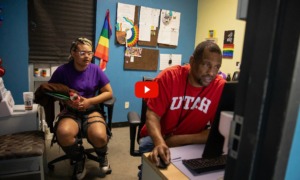David Krane and Julia Resnick
Girl Scouts of the USA
Study Conducted by Louis Harris & Associates, Inc.
September 1999
Executive summary at www.girlscouts.org/news/women_
define_success.html, or for $3 at
(800) 643-0639, ask for CSP#40322. Full report costs $7, ask for CSP#40323.
What helps make a girl grow up to be an accomplished woman? The Girl Scouts hired Louis Harris’ polling services to conduct a telephone survey, asking women which experiences as children and adolescents helped them to achieve success. Some of their answers may surprise you, and have important implications for youth workers.
The study included more than 1,300 American women, representing a diverse cross-section from all 50 states, and a group of 500 women who were selected because they were well-known professionals in business, government, academia, sports, and the arts, and leaders in community or volunteer organizations. The well-known professional women tended to have more positive attitudes towards themselves than the cross-section of American women, and were more likely to report that their achievements were linked to their experiences as youths. For that reason, this review will focus on the women of achievement, rather than the larger group of typical American women.
Having enough money when they were growing up was considered an important factor influencing their future success by only 15 percent of the white “women of achievement” and 21 percent of the African-American “women of achievement.” In contrast, religion and spirituality were considered greatly influential by 41 percent of the white women and 71 percent of the African Americans. Educational experiences as a child or youth were considered greatly influential by more than two-thirds of the whites, and even more (88 percent) of the African Americans. Self-confidence and one’s talents, abilities or interests as a child or youth were also considered greatly influential by more than half the women of achievement, and again by especially African-American women. Leadership opportunities as children and youth were cited as greatly influential by approximately half the women of both races. Belonging to youth development groups, such as Girl Scouts, Boys & Girls Clubs, Junior Achievement and 4-H Clubs was cited as greatly influential by 38 percent of the white women and half the African-American women.
Unfortunately, there was not enough diversity in the group of 500 women of achievement to compare racial or ethnic groups other than whites and African Americans. In the larger sample of women, the Hispanic women and Asian/Pacific Islanders’ responses were usually between the whites and African Americans, except that the Hispanics were especially unlikely to cite money as influential, and the Asians were less influenced than the other women by religion or membership in youth organizations or clubs. Native American women’s responses were often similar to those of white women.
When asked which person in their childhood and youth had a most positive influence on them, mothers were cited by almost half of the women and fathers by 27 percent. No other family members, teachers or friends were cited by more than 7 percent of the women.
Since the study was sponsored by the Girl Scouts, it included many questions about membership in youth organizations. Membership in Girl Scouts or Brownies was cited as influencing their future success “a great deal” or “somewhat” by 82 percent of the women of achievement. Other youth organizations were also “a great deal” or “somewhat” influential for 72 percent of these women, and other groups or clubs such as sports teams were cited by 44 percent. The women of achievement were more likely to have been Girl Scouts than were women in the general population, and they also viewed Girl Scouts as more influential toward their future achievements.
When an organization supports a study like this, there is an obvious incentive to make itself seem important. However, this study seems well-designed and the results are reported in sufficient detail to be persuasive that women who have attained an impressive level of success are more likely to look back on their childhood and youth as very important in helping them achieve as adults. Youth workers can be reassured that these women perceive groups like the Girl Scouts, Girls & Boys Clubs, Junior Achievement, 4-H, sports teams and other youth development organizations as one of the important influences.
























